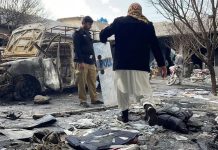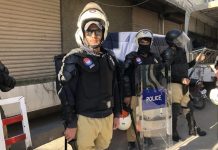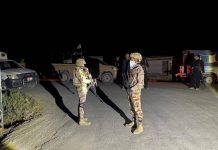In the Kech district of Balochistan, a border shutdown near Abdoi has led to over a thousand fuel-carrying vehicles being stranded, causing a humanitarian crisis. According to local sources, Pakistani forces have enforced a closure at the Abdoi border point for several days, trapping these vehicles on the Iranian side.
Drivers caught in this situation have reported severe hardships, facing extreme temperatures without adequate food or water. Many are pleading for intervention, asking authorities to either reopen the border or at least allow them to return home. Some drivers are reportedly facing deteriorating health conditions due to the harsh circumstances.
In Panjgur, a demonstration was organized outside the Deputy Commissioner’s office. The protest, led by the Border Bachao Tehreek, Traders Committee, and civil society members, demanded an end to the fuel embargo. Protestors carried placards emphasizing their demands. Following talks between ADC Ilyas Shad, Assistant Commissioner Panjgur Rizwan Qadir, and protestors, assurances were given that the district administration would address border issues with higher authorities. Subsequently, the protest was peacefully disbanded.
Recent developments have seen a series of increased restrictions by Pakistani authorities on the Pak-Iran border, which divides Balochistan. Multiple vehicles and their occupants have reportedly been detained by security forces. Balochistan’s nationalist political parties view these restrictions as a severe blow to the local economy. The National Party has announced a protest movement across the region, emphasizing that border trade shouldn’t be conflated with smuggling.
The party highlights the legitimacy of the fuel trade, noting that vehicles involved are registered and operate with the consent of local administrative bodies and FC authorities. They argue that these vehicles operate daily with formal permissions from deputy commissioners, contradicting claims that the proceeds from the oil trade are funnelled into terrorist activities. They highlighted the significant investment of the local populace into these ventures, often involving the sale of personal assets including jewellery and properties and have contested the allegations of misuse of funds from trade. Estimates suggest around fifty thousand such vehicles are registered in the Makran region alone.
The escalating situation highlights the fragile economic realities persisting in Balochistan. A significant part of the local populace in Balochistan heavily relies on border trade, particularly fuel trade, as a livelihood amidst limited opportunities. The recent stringent measures implemented by Pakistani authorities cast a shadow on this vital economic lifeline, potentially leaving the inhabitants in a precarious financial situation. Critics argue that this move might strip away one of the few sources of income without proposing any viable alternatives, exacerbating the growing discord between the Pakistani authorities and the local Baloch populace.





























